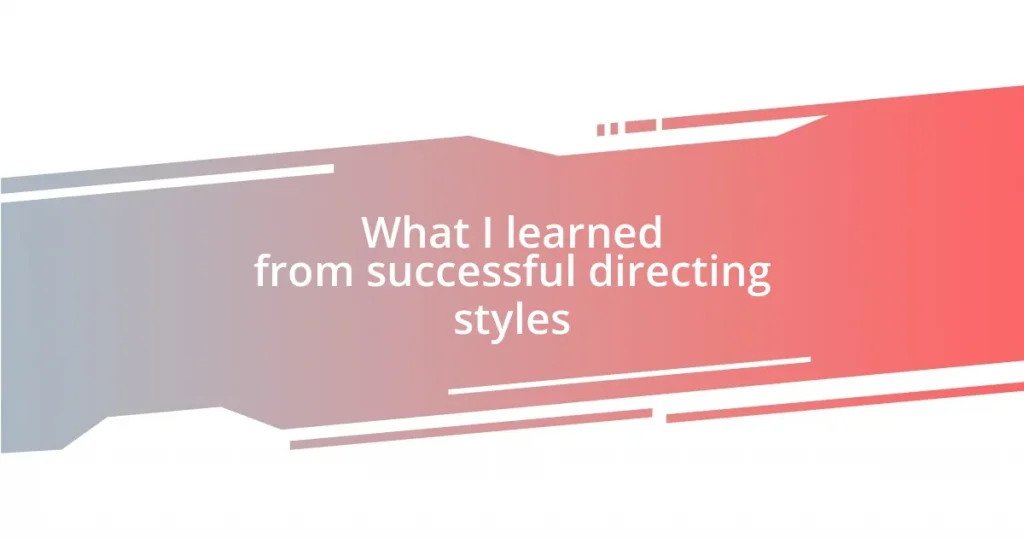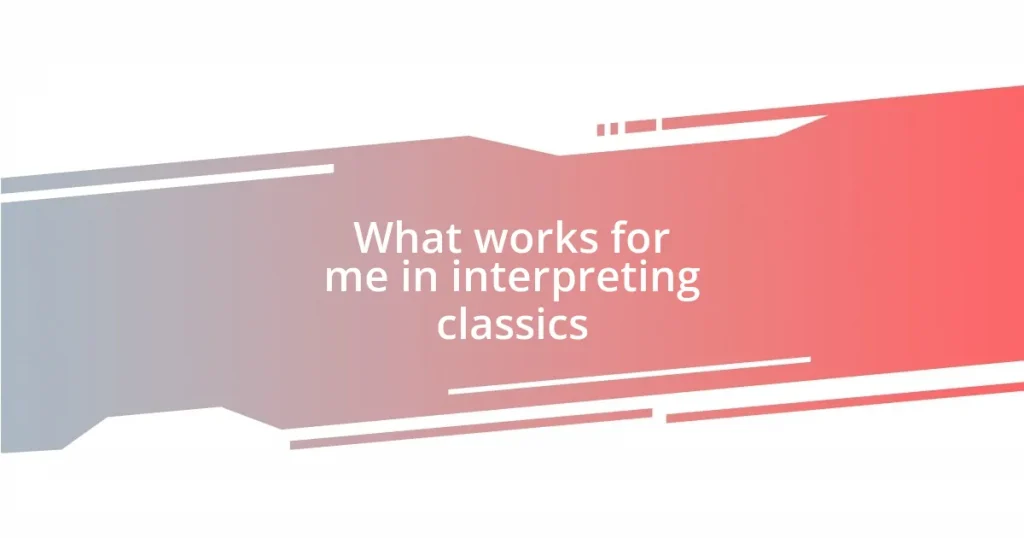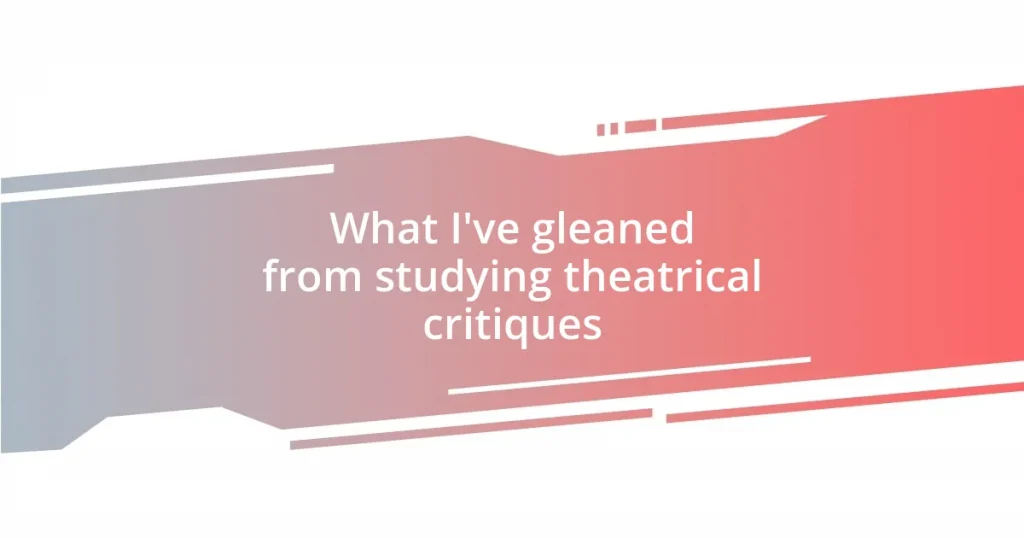Key takeaways:
- Authenticity involves being true to oneself and aligning actions with core values, enhancing trust and collaboration.
- Self-awareness is crucial for understanding emotions, improving relationships, and fostering personal growth.
- Identifying personal values guides decision-making and ensures fulfillment in various roles.
- Building supportive relationships through open communication and appreciation strengthens connections and promotes authenticity.

Understanding Authenticity in Roles
Authenticity in roles is about being true to oneself while navigating various expectations. I remember a time when I had to lead a team project at work. Instead of adopting a stiff demeanor, I let my personality shine through, which helped build trust and foster genuine collaboration. Doesn’t it feel great when you can bring your true self into your tasks?
Understanding authenticity also involves acknowledging the different layers we embody in various contexts—like hats we wear throughout our day. Each role has its nuances, but I’ve found that when I align my actions with my core values, I feel more fulfilled and less conflicted. Have you ever felt that sense of ease when you acted in line with your beliefs?
At its core, authenticity means embracing vulnerability and recognizing that imperfections aren’t setbacks but parts of our journey. I recall a moment when I shared a personal struggle with my colleagues, and rather than receiving judgment, I found connection. It really made me question: how often do we allow ourselves to be seen for who we are, flaws and all?

The Importance of Self-Awareness
Self-awareness is the foundation of authenticity. It helps me understand my strengths and areas for growth. There was a time when I misjudged my reaction during a challenging discussion at work, thinking I was being assertive. However, reflecting on it later, I realized I came off as defensive. This awareness shifted my approach to future conversations, making them more collaborative and productive.
Here are some key aspects that illustrate why self-awareness is so vital:
- Understanding Emotions: Self-awareness helps me identify and manage my feelings, ensuring my responses align with my values.
- Recognizing Triggers: By knowing what bothers me, I can navigate situations with greater ease, reducing unnecessary stress.
- Improving Relationships: When I’m clear about my thoughts and feelings, my interactions with others become more authentic and meaningful.
- Enhancing Decision-Making: Self-awareness leads to better choices, as I’m more in tune with my goals and motivations.
- Fostering Growth: Acknowledging my limitations allows me to seek help or acquire new skills, propelling my personal development.
Ultimately, self-awareness creates a powerful feedback loop that contributes significantly to staying authentic in our various roles.

Identifying Personal Values
Identifying personal values is a crucial step in maintaining authenticity. For me, it’s about understanding what truly matters in my life and how those priorities shape my actions. I remember sitting down one afternoon, reflecting on my core beliefs. I realized that integrity was at the top of my list. It wasn’t just an abstract idea; it guided my decisions every day, whether at work or in personal relationships. What about you? Have you taken the time to pinpoint your guiding principles?
Another important aspect of identifying personal values is recognizing how they influence my behavior in different situations. A few months ago, I faced a dilemma at work where I had to choose between meeting a tight deadline and maintaining quality. My value of excellence whispered to me, “Don’t compromise.” I chose to communicate the delay, resulting in a stronger team relationship built on trust. This experience reinforced my belief that when I stay true to my values, I find greater satisfaction in my work and interactions. Can you think of a moment when adhering to your values brought clarity to a tough decision?
To make this more tangible, I often find it helpful to compare my values against the roles I play in different aspects of my life. This alignment check provides clarity on where I might be straying from my authentic self. I created a simple table to illustrate how I assess this alignment.
| Role | Core Values |
|---|---|
| Team Leader | Integrity, Collaboration |
| Friend | Empathy, Loyalty |
| Family Member | Support, Love |

Techniques for Staying True
To stay true to myself, I find that setting aside quiet moments for reflection is essential. Recently, I took a weekend getaway alone, allowing me the space to think deeply about my commitments and how they align with my values. It was eye-opening. I came back with a clearer sense of direction and a renewed sense of purpose. How often do you give yourself that kind of time?
Another technique I employ is maintaining open lines of communication with those around me. A few months ago, I confided in a close coworker about feeling stretched too thin in my responsibilities. That conversation not only relieved some of my stress but also prompted me to reassess my workload and set healthier boundaries. Can you recall a time when a simple conversation led you to a more authentic version of yourself? I believe those dialogues are vital for growth.
I also turn to journaling as a powerful tool. Writing down my thoughts helps me articulate feelings and observe any patterns that emerge over time. Just last week, I noticed a recurring theme of frustration related to unrealistic expectations I was placing on myself. After reflecting on that, I allowed myself to let go of some pressures, and it felt liberating. Have you ever tried putting pen to paper to discover insights you didn’t know you had? It truly can reveal so much about where we stand in our journey toward authenticity.

Managing External Expectations
Managing external expectations can be a tricky balancing act. I recall an instance early in my career where my manager expected me to deliver results that felt unattainable. It pushed me to communicate my boundaries clearly. By explaining my limitations and advocating for what was achievable, I found that not only did I respect my own capabilities, but my manager appreciated the honesty. Have you ever encountered a situation where expressing your limits altered someone’s perception of you?
Another aspect I’ve learned is the importance of aligning external expectations with my inner values. For instance, when colleagues expect immediate responses to emails, I’ve had to recalibrate that to match my value of thoughtfulness in communication. I now set designated times to check my emails, allowing me to respond thoughtfully rather than reactively. Doesn’t it feel relieving to carve out space for your priorities while still being responsive?
Moreover, I’ve found it beneficial to embrace transparency about my priorities with those around me. Last year, I shared my long-term goals with my team, creating an understanding that not every immediate task was urgent. This candidness not only alleviated pressures I felt but encouraged my colleagues to express their needs as well. Have you ever thought about how sharing your aspirations shifts others’ expectations of you? It can open doors to collaboration and foster a supportive environment.

Building Supportive Relationships
Building supportive relationships is something I prioritize in my life. A while back, I found myself feeling isolated in a group project at work. Instead of staying quiet, I reached out to another teammate for a coffee chat. It was during that conversation that I realized how many others were grappling with similar feelings. Can you think of a time when opening up to someone transformed your perspective?
I also cherish the moments spent fostering connections through shared experiences. One evening, I organized a casual dinner with a few colleagues. We shared stories of our professional hurdles, and it was enlightening to see how vulnerability nurtured stronger bonds among us. Have you ever noticed how honest discussions can create a sense of belonging that enriches your environment?
As I reflect on these interactions, I recognize that showing appreciation goes a long way in building support. Last week, I took a moment to thank a colleague whose feedback had positively impacted my project. That small gesture not only made her smile but laid the groundwork for ongoing collaboration. How often do we pause to acknowledge those who uplift us? Those moments of gratitude can really solidify the trust that underpins supportive relationships.

Reflection and Continuous Improvement
Reflection has always been a key part of my personal growth. I remember a time when I completed a project I was particularly proud of, only to receive some critical feedback. Instead of dismissing it, I took a step back and really considered the points made. This moment taught me how valuable reflection can be; it not only improved my work but also deepened my understanding of my role. Have you ever found that a moment of reflection led to unexpected insights?
Continuous improvement is a journey I’m committed to, one that involves regularly revisiting my practices and strategies. After hosting a workshop, I felt a nagging itch that I could have done better. I sought feedback from participants and discovered new ways to engage them more effectively next time. This willingness to adapt and grow has become second nature to me. It’s fascinating how feedback, even when it’s tough to hear, can be a powerful catalyst for improvement, isn’t it?
I find that journaling my experiences is a practical tool in this continuous improvement process. On days when I feel overwhelmed, writing down my thoughts allows me to untangle my emotions. Just last month, I reflected on a challenging interaction at work and realized it was rooted in my own insecurities. By acknowledging this, I could approach similar situations with a newfound perspective. How often do you take the time to reflect and jot down what you learn? It can be enlightening, and I encourage anyone to try it out.















